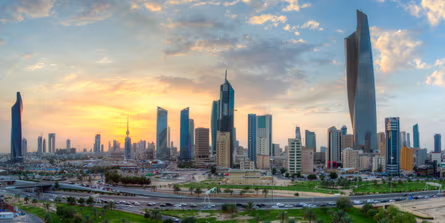Kuwait Records 49°C Amidst Escalating Climate Concerns
The Times of India | April 28, 2025
Kuwait has once again made global headlines after recording a staggering 49 degrees Celsius recently, highlighting the intensifying challenges of climate change in the Middle East. This extreme heat event is not just a temporary discomfort; it poses serious risks to public health, infrastructure, and the long-term sustainability of life in one of the world’s hottest regions.
Experts warn that such soaring temperatures could become the “new normal” unless urgent action is taken to combat global warming.
History of Rising Temperatures
Kuwait is no stranger to extreme heat. Over the past few decades, the country has witnessed a dramatic rise in maximum temperatures. In July 2016, the Mitribah weather station recorded a blistering 54°C, a figure later verified by the World Meteorological Organization (WMO) as the highest temperature ever recorded in Asia and the third-highest worldwide.
The trend continued in June 2021 when the city of Nawasib reported a temperature of 53.2°C, further emphasizing the region’s vulnerability to extreme heat.
With each passing year, summer temperatures seem to break new records, painting a worrying picture of what the future holds if climate change remains unchecked.
Health and Infrastructure Impacts

The health impacts of such extreme heat are immediate and severe. Prolonged exposure to high temperatures can lead to heat exhaustion, dehydration, heatstroke, and even death, particularly among vulnerable groups like the elderly, young children, and outdoor workers.
Doctors in Kuwait have reported a surge in heat-related illnesses during the peak summer months. Public health officials often issue warnings urging residents to stay indoors, hydrate frequently, and avoid outdoor activities during the hottest parts of the day.
On the infrastructure side, Kuwait’s power grid is under immense pressure. Air conditioning becomes a life-saving necessity rather than a luxury, causing a spike in electricity consumption. In some areas, this heavy demand has led to power outages, further worsening the situation for residents trying to cope with the unbearable heat.
Additionally, the extreme heat damages roads, warps rail tracks, and places additional stress on water supply systems — creating a cycle of infrastructural degradation that is costly and difficult to reverse.
Climate Change and Future Projections
Experts are clear about the cause: climate change is fueling these extreme temperatures. The Intergovernmental Panel on Climate Change (IPCC) has consistently warned that rising greenhouse gas emissions are increasing the frequency, intensity, and duration of heatwaves across the globe — with Middle Eastern countries like Kuwait among the hardest hit.
Climate models predict that if current emission trends continue, Kuwait could face summers where temperatures regularly exceed 50°C for extended periods.
Already, the number of days each year when temperatures surpass 50°C has more than tripled since 2000. Such conditions are not just uncomfortable; they could soon make certain areas unlivable for parts of the population, triggering migration and other socioeconomic crises.
Government Response and Challenges
Despite the escalating evidence of a warming planet, Kuwait’s government response remains slow and limited. The country’s economy is still heavily reliant on oil production, making it one of the highest per capita emitters of carbon dioxide globally.
While Kuwait has announced plans to diversify its energy sector by investing in solar energy projects and sustainable development, the pace of change has been criticized as inadequate given the urgency of the climate crisis.
Political gridlock, economic dependence on fossil fuels, and a lack of public pressure have all contributed to the slow movement towards meaningful climate action. Environmentalists argue that unless Kuwait — and other oil-dependent nations — adopt aggressive renewable energy strategies, the consequences will be devastating not just for the country but for the entire region.
Regional Implications
Kuwait’s record-breaking temperatures are not an isolated event. Neighboring countries like Iraq, Saudi Arabia, and Iran are also grappling with extreme heatwaves, droughts, and declining water resources.
The Middle East is already considered one of the most climate-vulnerable regions on the planet. Rising temperatures, combined with water scarcity and food insecurity, are creating fertile ground for social unrest, economic instability, and mass displacement.
Analysts warn that if regional governments do not act quickly, the Middle East could soon face one of the world’s most severe climate crises, with ripple effects reaching far beyond its borders.
What Needs to Be Done?
To prevent a full-blown climate disaster, experts recommend a multi-pronged strategy:
- Immediate reduction in carbon emissions through the adoption of clean energy sources like solar and wind.
- Investment in climate-resilient infrastructure to withstand extreme temperatures and protect public health.
- Public awareness campaigns to educate citizens on climate risks and adaptation methods.
- Regional cooperation to develop joint solutions for water management, food security, and renewable energy development.
Without urgent action, the heatwaves experienced today could pale in comparison to the environmental catastrophes of tomorrow.
Conclusion
The recent recording of 49 degrees Celsius in Kuwait is not just another weather statistic — it is a warning signal from our planet. Climate change is not a distant threat; it is happening now, reshaping our lives and environments in real time.
If Kuwait and other nations continue on their current path without significant climate mitigation efforts, the future could be even hotter, harsher, and far more difficult to survive.
The time to act is now — for Kuwait, for the Middle East, and for the world.
For more information click here



